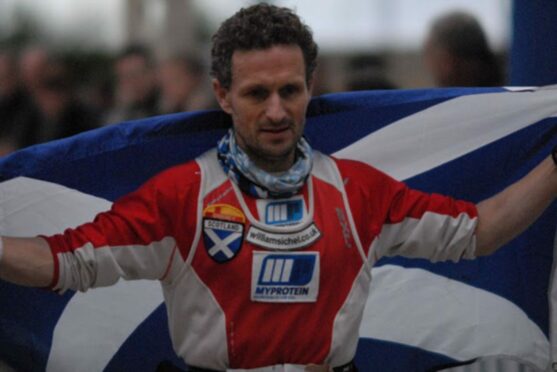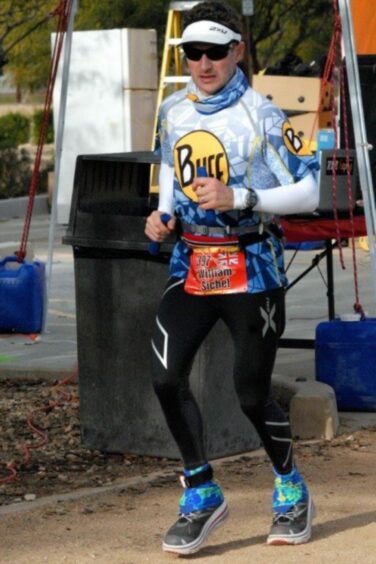It is finally the end of a very long road for a Scot who is still the greatest long distance pensioner on the planet.
After 110 ultra marathons, more than 25,000 racing miles – plus “hundreds” of pairs of worn out running shoes – William Sichel, 68, from Orkney says it is time to quit “the big” distances.
One of Scotland’s most remarkable athletes of all time, former angora wool dyer Mr Sichel – who now works as a part-time cleaner in the operating theatres in The Balfour Hospital in Kirkwall – says the ultra marathons have taught him, not surprisingly, “patience” and how to breathe properly.
His last race, pre pandemic, was two years ago in Athens – a mere 1000 miles.
But then Mr Sichel suffered a chronic bladder disorder that left him eventually needing surgery.
One of Scotland’s greatest
Mr Sichel has an incredible 758 ultra running records at World, British and Scottish level, including age-group records.
In 2019 the grandfather became the greatest long distance OAP over six days indoors and in 2010 set a new Over 55 World Age-Group record for 1000 miles of 13 days 20 hours 8 minutes 1 second.
But his greatest achievement came in 2014 when Mr Sichel became the first – and remains the only – person aged over 60 to ever complete the gruelling Sri Chinmoy Self Transcendence 3100 Mile Race, which sees athletes repeat a street circuit 5649 times to reach the distance.
Competitors have to run an average of at least two-and-a-half marathons a day for 52 days to meet the target in what is the world’s longest foot race. Only one other Brit has ever finished the event.
Mr Sichel had been due to repeat the incredible feat — which he completed over 51 days the first time around — in 2017.
But he pulled out at the last minute when his wife, Elizabeth, was diagnosed with terminal cancer.
She sadly died just 24 days later.
Mr Sichel, who has had his own personal battle with cancer, said: “Her death will, for me, always be linked with the 3100.”
Three times around the world
He attempted the race again in 2018, but fell just under 200 miles short in the allotted time after running over 2900 miles.
Incredibly Mr Sichel only started running when he was 39 – and that first jog around the block left him short of breath.
He entered the London Marathon in 1992 and recorded an impressive 2 hours 38 minutes.
The super-fit runner found he still had plenty of energy after finishing standard 26-mile marathons, so he took up ultra running.
“The racing is as much, if not more, of a mental thing as a physical test — your mind goes to places you did not know before. What I’ve learned from all those races is patience and how to breathe properly. I don’t think about anything when I’m running. That’s the aim,” said Mr Sichel, who burns 10,000 calories-a-day when he is racing and has a resting pulse of 43.
He has also run around the world the equivalent of three times and clocked-up his 100th ultra marathon in 2016. His shortest race was “just” 30 miles.
Scotland’s own Forrest Gump
The athlete, nicknamed Scotland’s own Forrest Gump, is so incredible that he became the subject of a scientific study by the University of Kent’s School of Sport and Exercise Science on the effects of sleep deprivation on endurance performance.
“Physiologically I am not that remarkable compared to thousands of other athletes, but I probably have exceptional mental strength. It is all in the mind,” said Mr Sichel, 68, who has decided to now concentrate on “shorter” races from 5k to full marathon.
“I still feel young and have new goals.
“But I’ve decided to call time on ultra running. It was a rocky road with my health issues and I just felt it was time to drop down to the shorter distances and see how fast I can go. I am fighting fit and doing 40-50 miles-a-week.
“After 110 ultra marathons, 25,000 miles – plus the miles clocked up in training – and 22 countries I felt it was time to move on.
“The irony is Orkney is holding its first ultra marathon this year, but I won’t be in it. I will be making my comeback in Edinburgh’s half marathon in May.
“Something I have learned over the years is allowing the distance to come to you, not rushing to get to it. Just like life. Daily routine is so important. If somebopdy says where they want to be in a year’s time, I say tell me what you are doing today? That is the key to realising goals in any walk of life, routine.”
Mr Sichel was treated for testicular cancer in 1997 but came back to win the World Masters 100km Championships the following year.
The runner has also represented Great Britain on 12 occasions and Scotland on six.
He is currently working on a book about his life story and tips, due to be published in November.

